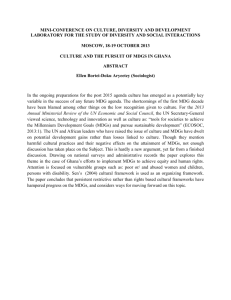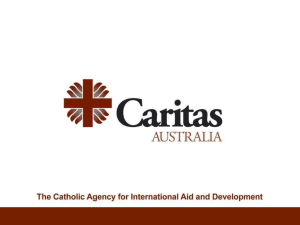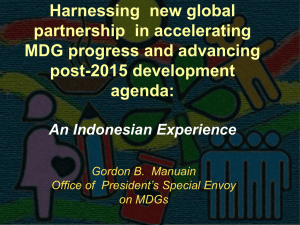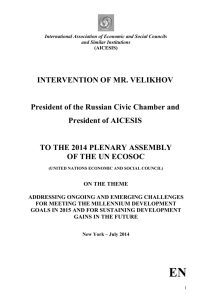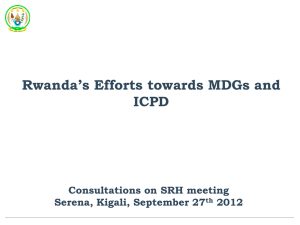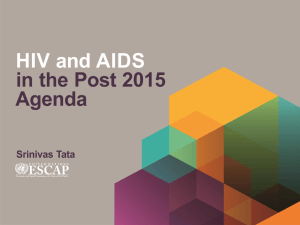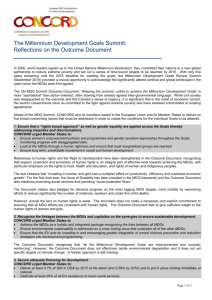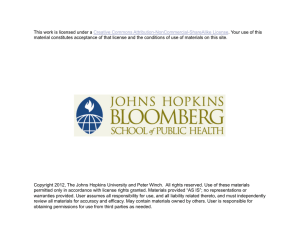ICDDR,B statment - Permanent Missions to the United Nations
advertisement
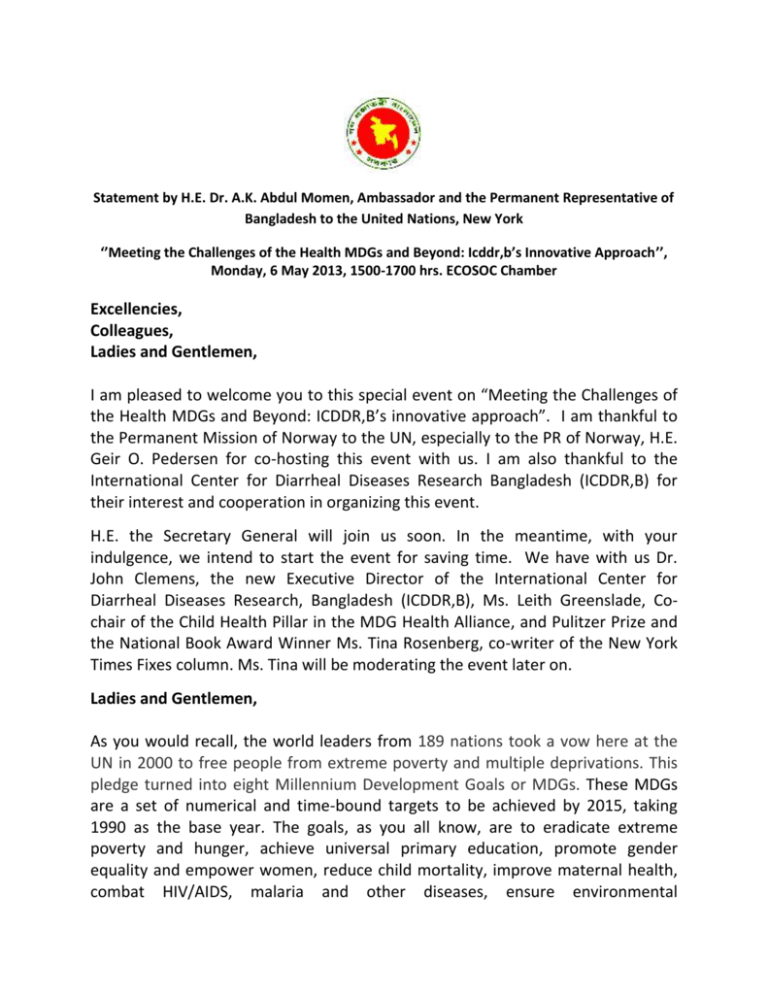
Statement by H.E. Dr. A.K. Abdul Momen, Ambassador and the Permanent Representative of Bangladesh to the United Nations, New York ‘’Meeting the Challenges of the Health MDGs and Beyond: Icddr,b’s Innovative Approach’’, Monday, 6 May 2013, 1500-1700 hrs. ECOSOC Chamber Excellencies, Colleagues, Ladies and Gentlemen, I am pleased to welcome you to this special event on “Meeting the Challenges of the Health MDGs and Beyond: ICDDR,B’s innovative approach”. I am thankful to the Permanent Mission of Norway to the UN, especially to the PR of Norway, H.E. Geir O. Pedersen for co-hosting this event with us. I am also thankful to the International Center for Diarrheal Diseases Research Bangladesh (ICDDR,B) for their interest and cooperation in organizing this event. H.E. the Secretary General will join us soon. In the meantime, with your indulgence, we intend to start the event for saving time. We have with us Dr. John Clemens, the new Executive Director of the International Center for Diarrheal Diseases Research, Bangladesh (ICDDR,B), Ms. Leith Greenslade, Cochair of the Child Health Pillar in the MDG Health Alliance, and Pulitzer Prize and the National Book Award Winner Ms. Tina Rosenberg, co-writer of the New York Times Fixes column. Ms. Tina will be moderating the event later on. Ladies and Gentlemen, As you would recall, the world leaders from 189 nations took a vow here at the UN in 2000 to free people from extreme poverty and multiple deprivations. This pledge turned into eight Millennium Development Goals or MDGs. These MDGs are a set of numerical and time-bound targets to be achieved by 2015, taking 1990 as the base year. The goals, as you all know, are to eradicate extreme poverty and hunger, achieve universal primary education, promote gender equality and empower women, reduce child mortality, improve maternal health, combat HIV/AIDS, malaria and other diseases, ensure environmental sustainability and develop a global partnership for development. Out of 8 MDGs, 4, 5 and 6 are directly related to health issues. They also play a cardinal role to facilitate achieving other MDGs. Therefore, our today’s event not only signifies our commitment to achieving health MDGs, it also gives us an opportunity to reflect on other MDGs. Distinguished colleagues, More than 12 years have passed since we took the vow or made the promise. Although our progress has been noteworthy, yet we could not reach our goals as per expectation. We are yet to see the world free from extreme poverty and nearly 1.4 billion still live below the poverty level. In other words, we are yet to achieve our promised targets including in the areas of health MDGs. As World Health Organization (WHO) reported in May 2012, approximately 800 women die every day from preventable causes related to pregnancy and childbirth and there were 219 million cases of malaria in 2010, of which estimated 660,000 deaths. According to UNAIDS statistics of 2011, 34.0 million people were living with HIV/AIDs. Against this backdrop, we are assembling here. It is a special time as momentum is building around the last 1000 days or precisely 975 days of action for MDGs. Global communities are taking stock of progress made so far and articulating their vision in the context of post-2015 Development Agenda. This event will give us an opportunity to reflect our collective wisdom towards achieving MDGs particularly health related ones and their future sustainability. Distinguished colleagues, With a modicum of satisfaction, may I report to you that Bangladesh either has achieved or on track in achieving many MDG goals. For example, MDG-1, eradication of poverty, Bangladesh has made commendable progress and reduced it by half. In the base year of 1991, our total population living below poverty line was 58.8 percent and in 2010, it reduced to 31%. By now its, around 27%. Yet nearly 41 million people are living below the poverty level. In achieving universal primary education, our net enrolment stood at 99.7 percent. On gender equality and empowerment of women, Bangladesh has become a reference point in recent days in all discussion on this issue. We have an impressive record of gender equality and women empowerment in all spheres of life. We have achieved it both in primary and secondary education enrolment. In Secondary level, our male-female ratio is 47:53. In addition, our top political leadership, for example, Prime Minister, Speaker of the Parliament, Leader of the Opposition, Deputy Leader in the Parliament, Foreign Minister, Agricultural Minister- all are women. I am not sure whether any other country has all three--I mean, Prime Minister, Leader of the Opposition and the Speaker are all women. On health related MDGs, particularly in the areas of reducing infant and child mortality rates, we have already achieved these targets. In maternal mortality ratio, we have reduced it from 322 per 100,000 live births in 2001 to 194 in 2010, an average annual reduction of 3.3 percent against MDGs target of 3 percent. I am confident that we will be able to achieve this MDG target before 2015. In MDG-6, we are hopeful of achieving it. In spite of resource gap and myriad constraints and limitation, we could achieve our MDG goals mostly due to innovative and targeted approaches, committed leadership, unique alliance and partnership between GO and NGOs, and of course, dynamic people. In addition, the UN agencies and our development partners also helped us in the process. Distinguished colleagues, In post-2015 scenario, while we take stock of the MDG achievements, we are afraid of sustainability, more so owing to our vulnerability and climate change. Even for the achieved targets, we will need well calibrated action program for their sustainability. They have to be complemented by necessary systemic support both internally and from international community. Unimpeded market access, technology transfer at affordable price, infrastructure development, developing knowledge-based economy, ensuring quality education, employment generation and training, food security, energy security and efficiency, reform of international financial architecture, reform of free mobility of production inputs including capital, technology and labor, are among a few that need to be imparted to the developing world. In this regard, our collective efforts should be focused on achieving MDG 8, the weakest of all so that we don’t have to revert to square one, despite political will of the respective governments. South-South and North partnership is essential for a 'win-win situation' for all. As I stated earlier, our partnership with Non-governmental entities has made notable contribution in the process of our MDG achievements. A glaring example is the ICDDR,B. Since 1978 this institution has been involved for development of training of professionals in health management especially in management of diarrheal diseases, reducing infant and child mortality rates and supporting family planning. Over the years, the relationship between icddr,b and the government of Bangladesh flourished and evolved into a truly collaborative nature. This collaboration has translated into effective action for achieving MDGs 4 and 5. The discovery of icddr,b of zinc supplementation and Oral Rehydration Solution (ORS) for diarrhea treatment and prevention is phenomenal. These discoveries and correct application of them has saved millions of people and helped achieving our MDG goals. The lessons learnt from the successful scale-up of ORS and zinc in Bangladesh are now being used by the governments and implementing NGOs in 9 other countries including Haiti, Pakistan, Zimbabwe, Papua New Guinea and Nepal to help contain cholera outbreaks with commendable success. In fact, this Institution has shared its knowledge with the world, training more than 27,000 health professionals from over 78 countries. It's courses provide practical training in topics such as hospital management of diarrhoeal diseases, epidemiology, biostatistics, family planning, demographic surveillance and child survival strategies. No wonder, its programs are supported by 55 donor countries and organizations including the Government of Bangladesh, UN specialized agencies, foundations, universities, research institutes and private sector organizations and companies that share the Centre’s concern for the health problems of developing countries and value its proven experience in helping solve those problems. While I hope, today's event will open the window for other countries to benefit from the innovation of icddr,b in achieving their health MDGs, it will also help icddr,b to have adequate financing and help it to get Global Award, maybe a Nobel Prize Award for its contribution in saving lives and providing hope to vulnerable people across nations. Thank you all.
